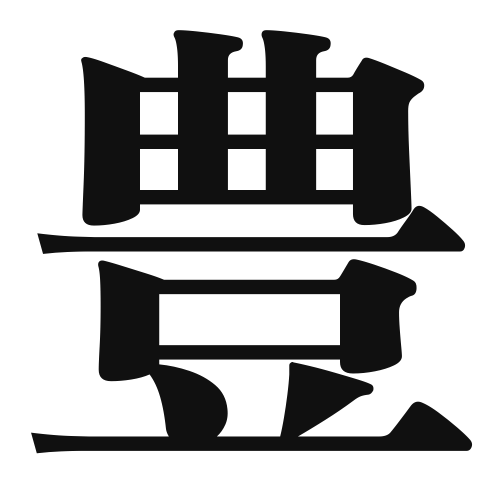1. Overview of Meaning
The kanji “豊” (yutaka) means “abundant” or “rich.” It conveys a sense of plenty, prosperity, and fullness, often associated with nature, resources, and well-being.
2. Formation and Radical
Formation of the Kanji: The kanji “豊” is a phonetic-ideographic character (形声文字) that combines elements to convey its meaning. The left part, “豊,” represents the idea of abundance, while the right part, “豕,” symbolizes a pig, which historically signifies wealth and prosperity in agricultural societies.
Radical: The radical of “豊” is “豕,” which relates to animals, particularly livestock, emphasizing the connection between wealth and agricultural abundance.
3. Examples of Usage
Common Words and Phrases:
- 豊かさ (yutakasa) – abundance, richness
- 豊富 (hōfu) – plentiful, abundant
Example Sentences in Daily Conversation:
- この地域は豊かな自然があります。 (Kono chiiki wa yutakana shizen ga arimasu.) – This area has abundant nature.
- 彼は豊富な知識を持っています。 (Kare wa hōfu na chishiki o motteimasu.) – He has a wealth of knowledge.
4. Synonyms and Antonyms
Similar Kanji:
- 富 (tomi) – wealth; while both “豊” and “富” relate to abundance, “富” specifically refers to material wealth.
- 満 (man) – full; this kanji emphasizes completeness rather than abundance.
Antonyms:
- 貧 (hin) – poverty; this kanji represents a lack of resources or wealth.
- 不足 (busoku) – insufficiency; it indicates a shortage or lack of something.
5. Cultural and Historical Background
Connection to Japanese Culture: The concept of “豊” is deeply rooted in Japanese culture, where abundance is often celebrated in festivals and agricultural practices. It reflects the importance of nature and the bountiful harvests in traditional Japanese life.
Proverbs and Idioms:
- 豊作 (hōsaku) – a good harvest; this term is used to express gratitude for a plentiful yield.
- 豊かな心 (yutakana kokoro) – a rich heart; this phrase signifies generosity and kindness.
